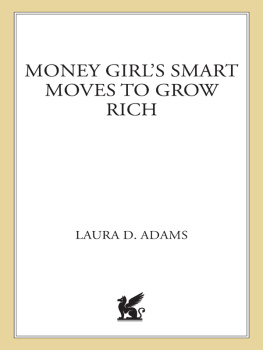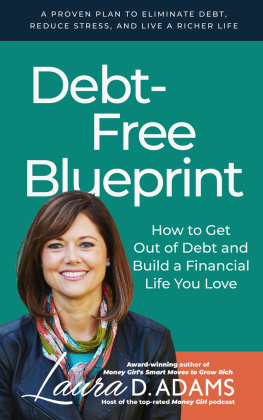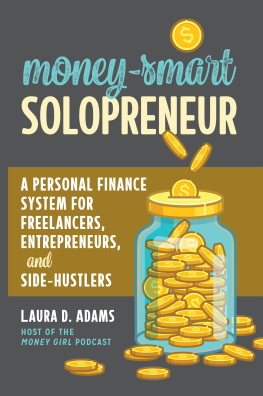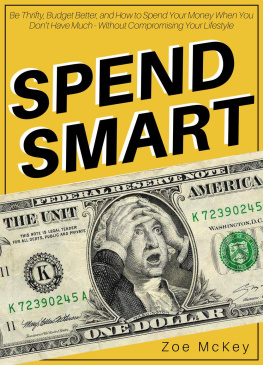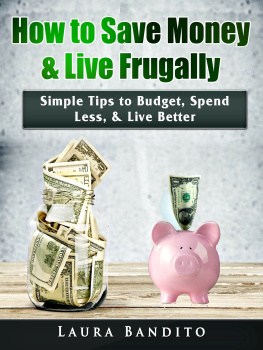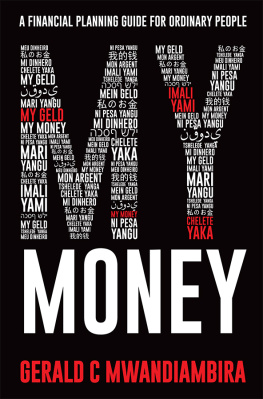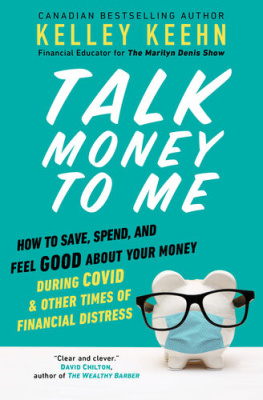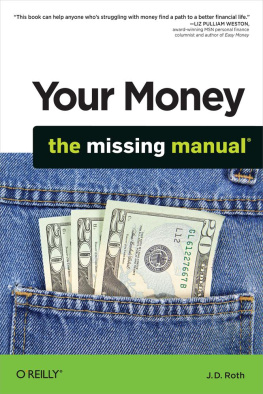
For Adam and Dixie
Contents

Introduction
Ive always enjoyed managing money. As a young high school kid, I couldnt wait to get my own checking account. But as I got older, graduated from college, and went out on my own, I discovered that I had a lot to learn about money. Even working in accounting didnt teach me what I needed to know to stay out of trouble. I fell into the trap that so many people doliving above my means. I rented apartments that I couldnt afford. I spent too much on vacations. I became a shopaholic. My first coworkers in Atlanta, Georgia, made comments about how I always showed up in new clothes and never wore the same outfit twice. They assumed I was living at home with financial support from my parents. I could see the shock on their faces when I told them that, no, I lived on my own. The reality is that I was being supportednot by my parents, but by my credit card!
Later on, I brought my credit card debt into my marriage. As we unpacked big cardboard boxes and started to fill our only bedroom closet, my husband asked, So, exactly how many pairs of shoes do you have? It was obvious that my shopping habit would put a squeeze not just on closet space but on our finances as well. After getting extremely anxious about our growing credit card balance, we made a commitment to cut way back and slowly pay off the card. Ill never forget the feeling of accomplishment we had after making the final payment.
Since then Ive done a 180my passion for spending has turned into a passion for saving, investing, and every aspect of personal finance. What Ive learned along the way is that you cant manage your money wisely if you dont know how. Many people I talk to about money say something like, Isnt it a shame that we didnt learn financial stuff in high school? It is a shame, because you dont know what you dont know. Over the years, I went searching for financial answers from lots of books, financial gurus, professional advisers, and eventually graduate school. I accrued so much knowledge, that I then began sharing my financial knowledge as the host of the Money Girl blog and audio podcast on the Quick and Dirty Tips Network (QDT). As Money Girl, I get all kinds of questions from people who want to take control of their finances but just dont know how. They want to know how to pay off their credit card bills faster, how to choose the best checking and savings accounts, and how to make sure theyre saving enough for retirement. My mission as Money Girl is to tell you what you really need to know to master your money, make the right moves, and set yourself up for lasting financial security.
The bottom line is that youre responsible for your own financial well-being, but we live in a world full of complex financial concepts and products. I understand how hard that can be when youre trying to figure out how much to save for retirement, what type of mortgage to get, or how to make investments that arent too risky. Not only are you managing money in challenging economic times, but there are new tax laws, modernized banking methods, different credit guidelines, and predatory scams to stay on top of. That inspires me to make personal finances easier for you by creating simple explanations, down-to-earth examples, and quick tips that you can put to use right away.
Maybe youre just getting started in the working world and want to make sure youre keeping your money in the right place. Chapter 7 will give you tips on how to grow your money using retirement accounts like IRAs and 401(k)s. Perhaps youre frustrated about your debt, indecisive about your investment choices, unsure about refinancing, or want a faster way to manage your money. If so, keep reading because those are just a smattering of the topics covered in this book. Theres a chapter devoted to figuring out where your finances are right now, where you want to take them, and exactly how to bridge the gap. Youll see how easy it is to reorganize your banking so you can earn more money and keep tabs on all your spending with the most modern tools and technology. Chapter 5 will give you hope because there are real ways to reduce and eliminate your debtI cover them all in detail. Youll get completely up-to-speed on the fundamentals of investing, and by the end of the book youll know exactly how to save money on your everyday expenses, pick investments, cut your tax bill, buy real estate, pay for education, and lots more. No matter if youre struggling to meet your basic needs or have plenty of income, youll benefit from this information. If you havent saved a dime for retirement or are in too much debt (like I was years ago), this book will help you take control of your finances. What youll find is that once you have good financial knowledge, its simple to put it into practice and improve your situation.
The purpose of this book is to help you create a richer life. Financial struggles can weigh you down psychologically and hold you back from being who you really want to be. I hope to give you the tips, tools, and inspiration to master your finances, leverage your resources, and reach your highest potential. Small changes in lifestyle and financial routines can create big bank accounts thatll be there when you want to retire, start a business, send a child to college, or give to others in need. Making the right moves now will not only help you manage your money better, youll grow richer as well.

Whats Your Money Mind-set?
If you want to create wealth, it is imperative that you believe that you are at the steering wheel of life, especially your financial life.
T. HARV EKER , author of Secrets of the Millionaire Mind
As Money Girl, I love answering peoples questions and sharing helpful financial information and timely tips. In addition to enjoying the nuts and bolts of things like retirement accounts, mortgages, and taxes, Im also fascinated by the way people think about money. I call it our money mind-set. Your money mind-setor thoughts about moneyare important because theyre the precursor to your behavior. In other words, your thoughts turn into actions. If your money mind-set is unhealthy, it only makes sense that youll probably make some (or a lot of) financial mistakes.
Many people make the same slip-ups with money over and over again because theyre stuck in bad patterns of behavior. They may know an awful lot about making good investments, for example, but cant ever manage to spend less than they make each month and so waste all of their investment knowledge when they have nothing to invest with. The problem isnt a lack of knowledge or the economyits them! Its not all gloom and doom, however, because bad financial habits can be fixed. Raising your awareness about them is half the battle. Then you can put the information, tips, and tools in this book into action to take control of your money and make the smart moves needed to get your personal finances back on track and start growing your wealth. In this chapter, Ill help you think about some of the issues that may be getting in the way of your ability to make the most of your money. Lets start by looking at how youve grown to relate to money over the years and bring to light any bad habits youve picked up along the way.

